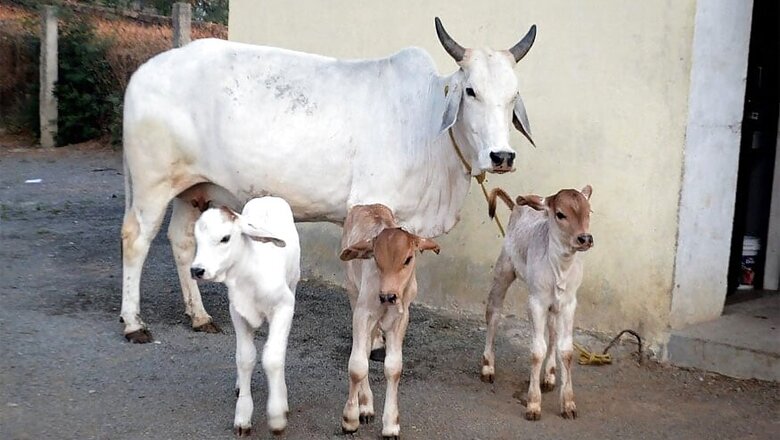
views
Pune: The joy of Majid Pathan knew no bounds when he cuddled 'Vijay', the male calf delivered by a surrogate mother cow through In Vitro Fertilisation (IVF) in a mobile laboratory at his farm, thanks to technological advancement.
The NGO involved in the process claimed it to be the first calf delivered through IVF at a farmer's doorstep at Indapur tehsil, about 150 kms from here.
The farmer feels more confident when the lab comes to his doorstep for offering the services, says a senior scientist involved in the process.
The healthy male calf (Gir breed) was born on August 20 at Rachana Khillar Farm, owned by Pathan, at Loni Deokar village in Indapur tehsil, said Dr Shyam Zawar, the CEO of JK Trust and the chief scientist at JK BovaGenix, who led the entire process.
JK BovaGenix, an initiative of JK Trust, one of the largest NGOs working for cattle and buffalo breed improvement in India, claimed it to be the first calf delivered through IVF technology at a farmer's doorstep.
"The process involved a highly advanced technique which requires high precision and accuracy and is similar to 'test tube baby' in humans," Zawar said.
He said the trust has two high labs in Maharashtra and Chhattisgarh to facilitate the production of IVF calves.
"However, this time, we went one step ahead by taking this technology to the doorstep of the dairy farmers as the aim was to conduct the entire procedure in front of the farm owner," he said.
"A specially designed mobile laboratory, the ET-IVF Van, was taken to Rachana Khillar Farm, where the oocytes, or immature eggs, were collected from the donor cow, named 'Ratan', on November 9 last year," said Zawar.
The aspirated oocytes were fertilised with the semen of high pedigree bulls, which resulted in the production of good quality viable embryos.
"These embryos were transferred fresh into the recipient cow of the Farm on November 16, 2016 and after completion of the pregnancy period, the recipient cow delivered a healthy male calf on August 20," Zawar said.
He said the farmer feels more confident when the lab comes to his doorstep to offer the services.
"One can imagine his happiness when he will see the embryos produced in the lab develop into calves because he has been a witness to the entire procedure," he said.
The indigenous cow breeds like Gir, Tharparkar, Sahiwal, Khillar and others have been dwindling as cross-breeding is happening on a large scale, Zawar said, adding there is a need to protect the breeds in their original form.
"Generally a cow, in its average 15 years of lifetime, can give birth to maximum 10 calves. However, using the IVF technique, the same cow can give birth to 20 calves in a year and if you multiply it with 10 years, the same cow will give birth to 200 calves," he said.
In the present case, the donor cow, Ratan, belongs to Gir breed found in Gujarat, Rajasthan and Maharashtra. A cow of this breed gives 10 to 12 litres milk every day, he said.
"The milk from Indian cows falls in A2 category, which is considered as superior as it has healing properties, so it is important to promote the high-yielding indigenous varieties in the country," he said.
Zawar said they are hopeful of promoting the usage of IVF technology to multiply genetically superior indigenous cows at a much faster pace, in line with the Government of India's Rashtriya Gokul Mission.
The initiative by JK BovaGenix was conceptualised last year under the guidance of Dr Vijaypat Singhania, the chairman of JK Trust, to popularise advanced assisted reproductive technologies in cattle for faster genetic improvement of indigenous cattle population, the NGO said.
Besides Pathan's farm, similar experiments were carried at a couple of other farms in Pune district, where the oocytes of donor cows (Gir, Khillar and Tharparkar breeds) were taken in November last year and the surrogate cows are expected to give birth in next few days, Zawar said.

















Comments
0 comment